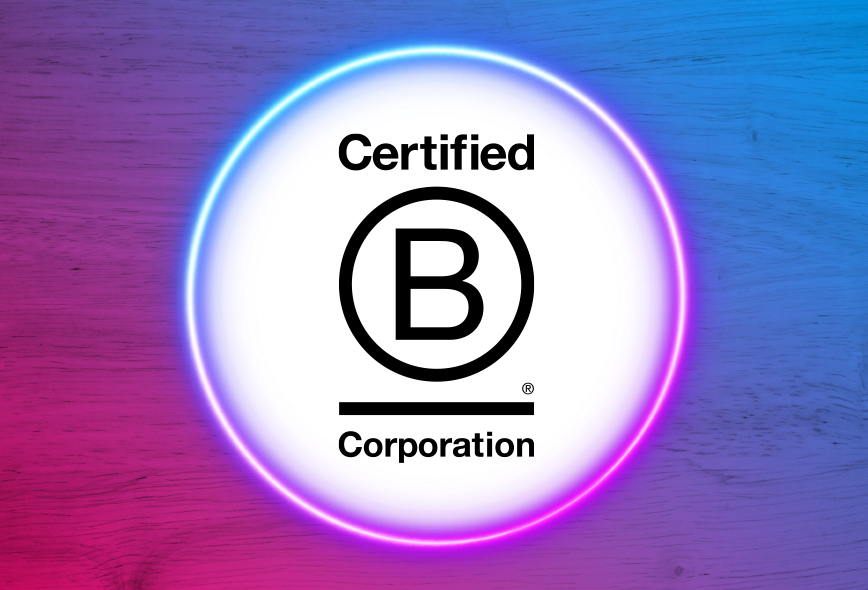IMPACT BEYOND BUSINESS

FROM ENVIRONMENT TO CULTURE AND MORE
People. Planet. Profit. The three priorities in our push for sustainability on all fronts, as we use our growth to improve and increase the impact CP has, Beyond Business.
From the environment (we’re proud to be the UK’s largest accountancy B Corp) and our multi-award-winning culture to our diversity & inclusion team and our firm-wide Volunteering days, each piece in the puzzle gets people better educated and helps us build a better tomorrow.
Find out more about some of our initiatives below. We’d love to hear about yours too. So, if you’d like to have a chat or swap some ideas, get in touch and we’ll get straight back to you.


IMPACT REPORT
We’re all about transparency at Cooper Parry, and as the UK’s largest accountancy B Corp, we’re all about sustainability too.
Our annual Impact Report combines the two to give you a closer look than ever before at how we’re improving and measuring our impact on people and the planet.
In this edition, which covers May 2023 – April 2024, we’ve shared the highs, lows and lessons from our ongoing, never-ending sustainability journey.
And if it prompts any questions, ideas or otherwise, we’d love to chat.




Services
Select a heading to find out more about Impact Beyond Business
-
WE’RE B CORP, BUT THE JOURNEY DOESN’T STOP HERE
We’re committed to using CP as a force for good. Measuring our impact at all levels, across all stakeholders, and holding ourselves to the highest standards – for our people, clients, communities, and the environment.
That’s why we’re proud to be the UK’s largest accountancy B Corp, joining the business movement tackling society’s greatest challenges.
We’re on a continuous journey of improvement, making positive changes throughout the whole business. From reducing our business travel to revamping our purchasing policy to focus on locally sourced, environmentally friendly products, we’re on a mission to make a difference to people and the planet. We’ve also revamped our purchasing policy to focus on locally sourced, environmentally friendly products.
Our Diversity & Inclusion team continue to embed inclusivity and a celebration of diversity into our culture, improving the accessibility of our recruitment process and training all our people to better understand the importance and nuance of Diversity & Inclusion.
We’re transparent. We’re accountable. And with so much happening at CP – and still so much to learn – we’re always up for sharing ideas and ground-breaking ways to support each other and make an impact that goes beyond profit.
That way, we can build stronger, healthier, and more sustainable businesses. Together.
Check out our official B Corp profile here.
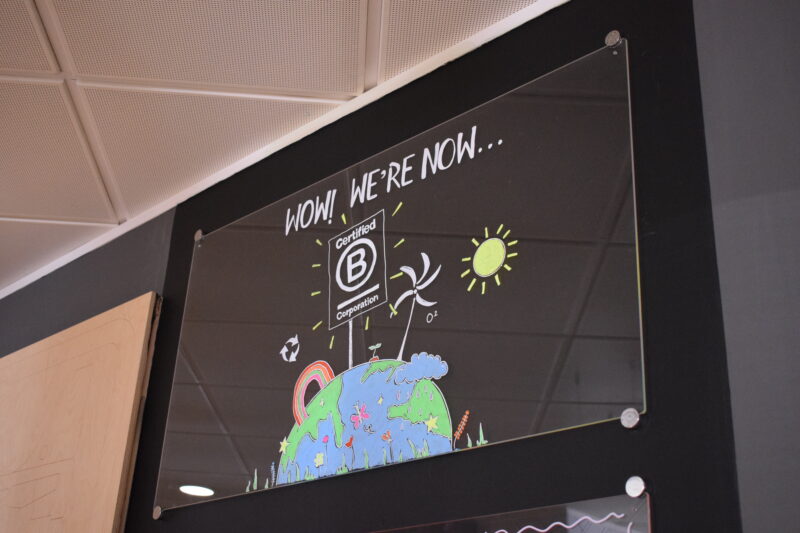
-
BUILDING A CULTURE THAT’S A CUT ABOVE THE REST
If you sliced Cooper Parry open (more cake, less autopsy), you’d find one flavour oozing out above all others: culture.
It counts for so much here, guiding how we treat each other, how we work with you, our awesome clients, and how we make sure CP has a long-lasting, positive impact on our people, communities, and the environment.
Trust is at its core. Brought to life by open holiday, ‘Work From Anywhere. Anytime. Forever’ and our innovative 100-80-100 experiment (you may know it as the 4-day working week, but we’re trying something a little different), we give our people the power to work whenever, wherever, however suits them.
Whisk in a multi-award-winning wellbeing strategy, unrivalled benefits and a showstopping social calendar, and you’ve got a recipe for people feeling happy, fulfilled, and motivated. Every single day.
In return, we ask for one thing: produce incredible work. And judging by our industry-leading NPS scores and satisfaction ratings, boy do they oblige.
Our in-house Sustainability team measure and improve our impact on the environment, sharing tips with everyone across CP, so they can make planet-powered changes in their own lives. And in February 2023, we became the UK’s largest accountancy B Corp.
Our Diversity & Inclusion team embed inclusivity and a celebration of diversity into our culture, improving the accessibility of our recruitment process and training all our people to better understand the importance and nuance of Diversity & Inclusion. In particular, their campaigns on neurodiversity and eating disorders have really struck a chord in recent times, sparking important discussion and warm support, CP-wide.
We love volunteering too. It’s how we give back to our communities and make a difference Beyond Business. We work with the brilliant onHand to give our people easy access to volunteering opportunities in their local areas, every day. And we commit our Community Day every year, when we all log off and head out to support the causes that matter to us.
By maintaining a laser-focus on culture, we’ve become a permanent feature in the Sunday Times 100 Best Companies to Work For list, and the Best Accountancy Firm to Work For in the UK.
So yeah, it means everything here. And while we know we’ll never have all the answers, that won’t stop us trying. Drop us a note and we can swap some ideas. We’re always eager to learn, especially over coffee.

-
CORPORATE SOCIAL RESPONSIBILITY. IT ALL SOUNDS SO, WELL, DEAD DULL AND CORPORATE. AND THAT’S JUST NOT US.
But we love what it stands for: doing the right thing. Not as an obligation but knowing that it can make a real difference. At a tiny day-to-day level and in a big picture/big planet kind of way.
‘In It Together’ is one of our five core values. And when it comes to our local communities, that’s never rung truer.
We know we’re in a unique position, with hundreds of likeminded people across the UK, willing to lend a hand where it’s needed most. We want to do our bit to better our communities, socially and economically.
That’s why we’ve made giving back part of our DNA at Cooper Parry. And we do loads of different things to help the environment and get stuck in with different cool projects in and around our community.
We have a company-wide Community Day, for one. A day where we log off and head out to support important causes. Each year, this equates to thousands of hours spent making a difference in our local communities.
We also have our annual Golden Oldies party – one of the most anticipated dates in the CP calendar. In the lead-up to Christmas, we invite elderly members of the community to our office for a slap-up Christmas dinner, party games, dancing, and a whole load of chinwagging.
Each year, our people vote for our partner charity, and countless things happen throughout the year to support that organisation. We’re always looking for new ways to make an impact in our communities – and new initiatives to support – so if you’d like to talk about how we can help, let us know.
-
“At Cooper Parry, our people drive our business, not the other way around. When we create a space where everyone can bring their whole selves to work, we create potential for more innovation, more productivity, and greater employee wellbeing.
As D&I Coordinator, I find it a real privilege to help CP lead the way in workplace inclusivity, disrupt societal norms and stereotypes that perpetuate inequity in the workplace, and make life count for all our people.”
– Lydia Stott, CP’s Diversity & Inclusion Advisor
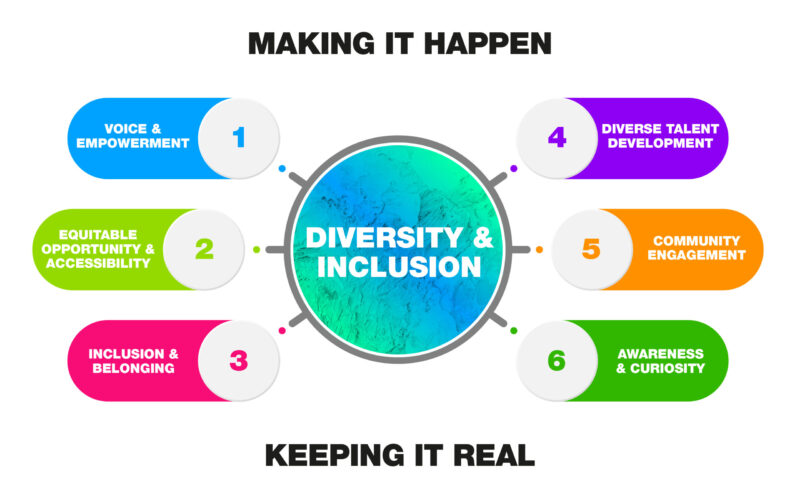
Our long-term D&I goals:
- Have a diverse workforce reflective of the communities we are in.
- Have full awareness of the challenges faced by individuals within CP and society and enact policies and individual support to minimise their impact.
- Embed inclusivity and a celebration of diversity into the culture of CP.
- Actively listen to those who are under-represented or who may face discrimination and amplify their voices within CP and in the wider community.
- Work with external organisations to support the training of youth from diverse backgrounds to develop long-term diverse talent pools.
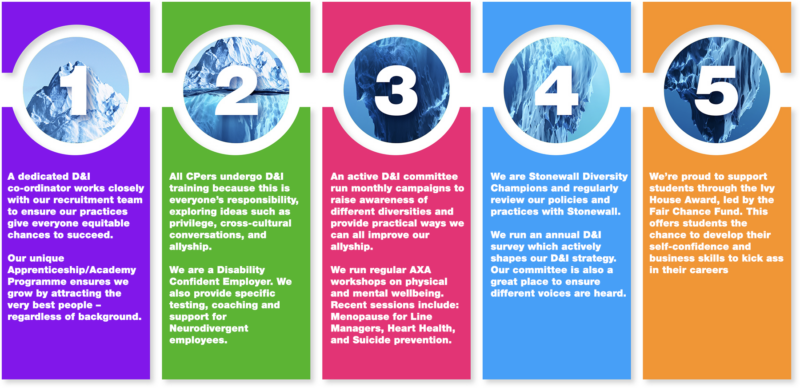
We’re committed to helping out where we can, and we currently sponsor 32 students aged 15-18 from St Mark’s School in Hounslow to take part in the Ivy House Award.
The Fair Chance Fund programme targets students from disadvantaged backgrounds and offers a year-long extra-curricular activity focussed on developing future professional leaders.
The students learn leadership skills, gain an understanding of the workplace and business, and grow their self-confidence.
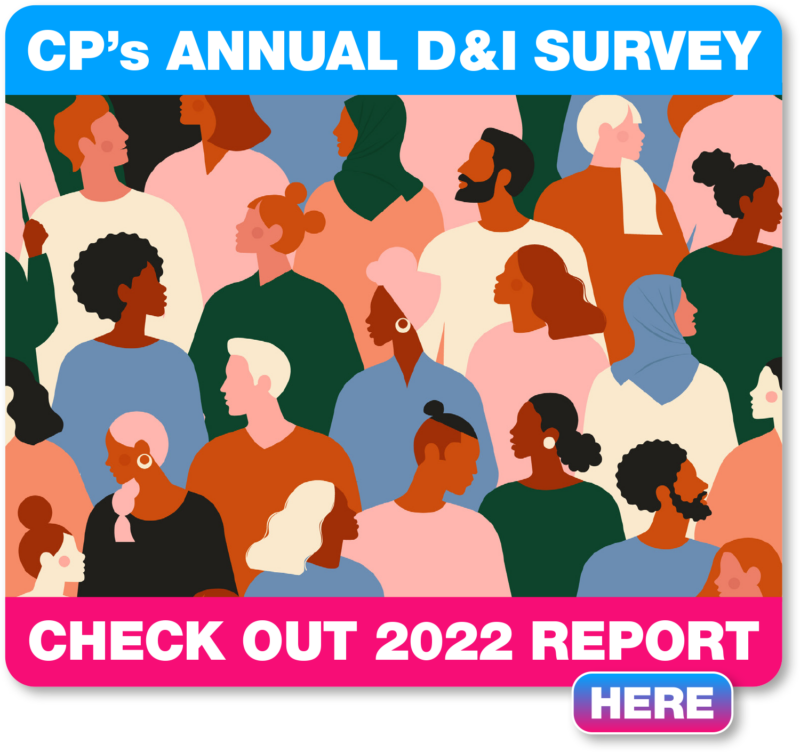
-
LOOKING AFTER OUR LOVELY PLANET
Looking after our planet is at the top of our agenda. A cornerstone of the CP values and a key part of our commitment to using business as a force for good by meeting B Corp’s standards of social and environmental accountability.
Across our offices, we have an Environmental Preferable Purchasing Policy which covers paper, food, cleaning products and office supplies. Alongside this, we use 100% renewable energy at our Sky View HQ. And over 75% of our energy use is produced from low impact renewable energy sources.
Result.
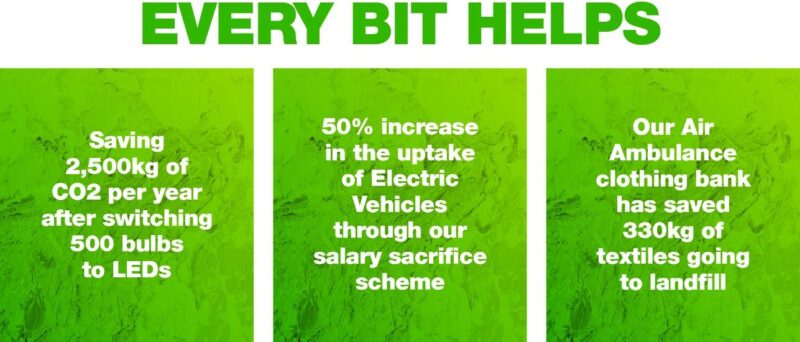
We have conservation measures in place too, saving over 20% of our energy due to our lighting, HVAC systems and equipment. Our 4 electric vehicle charging points make a difference at Sky View, and they’re free to use if you’re ever visiting. We can’t wait to see how much CO2 we manage to save going forward.
If you’re swinging by, bring your unwanted garments with you to pop in our Air Ambulance clothing bank and we’ll get them recycled. Just remember to stick to our office dress code: “wear something.”
As the UK’s largest B Corp accountancy firm, taking care of our planet is a top priority. That’s why we’re on a mission to slash our emissions by 2030 and hit net-zero greenhouse gas emissions by FY2045.
We’re very excited to share that our Near-Term and Net-Zero science-based emissions reduction targets have been approved by the Science Based Targets initiative (SBTi).
We’ve already started our journey towards a net-zero future and are busy creating a clear and practical net zero path.
So, watch this space.



DIVERSITY & INCLUSION
GET IN TOUCH WITH NICOLETA VOICU
Nicoleta Voicu
Head Of Sustainability















